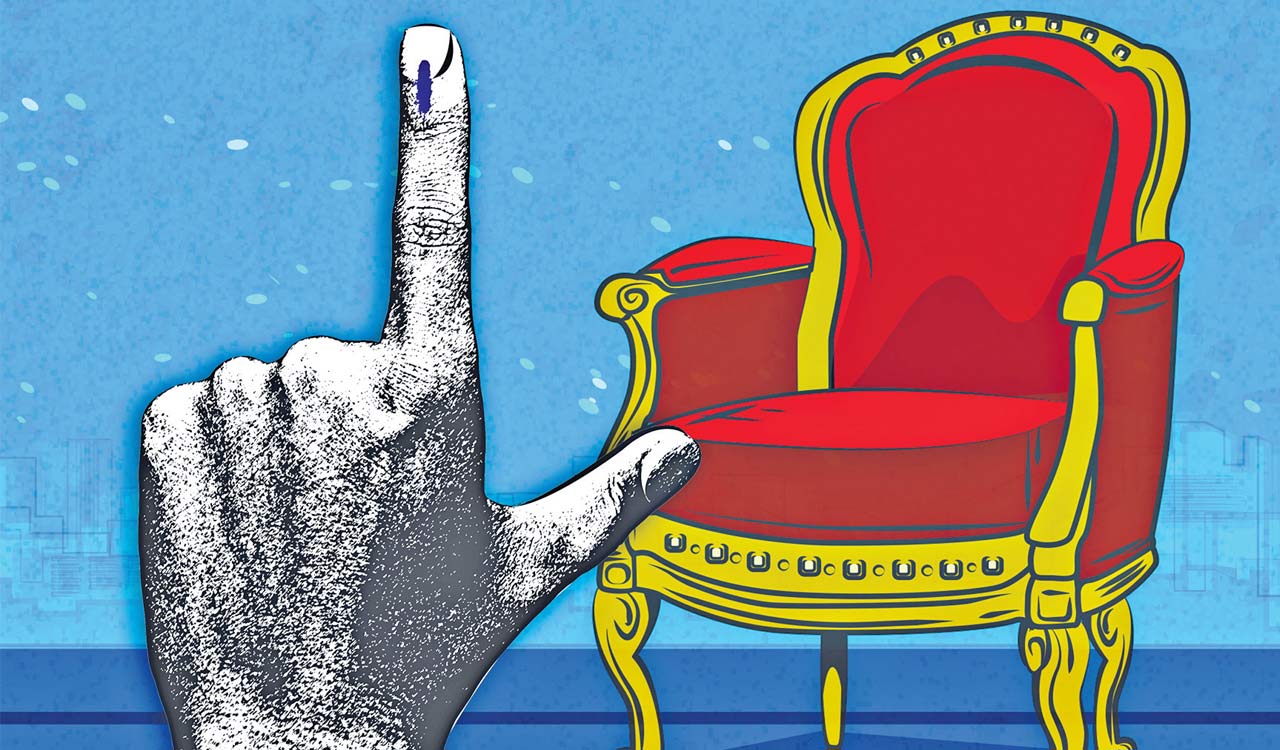
Defection is more than just a political manoeuvre; it is a challenge to the democratic ethos
Published Date - 27 June 2024, 11:56 PM
By Dr Chaketi Raju
In contemporary India, the electoral landscape is increasingly becoming a battleground for political manoeuvring, with “party switching” emerging as a strategic tool to lure influential leaders from other parties. In a surprising political shift, Members of the Legislative Assembly (MLAs) from the BRS have defected from their original parties to join the ruling Congress in Telangana. This move has sparked a debate about the integrity of the democratic process and the respect for voters’ choices in the recent Assembly elections. Often referred to as “defection”, this phenomenon has prompted discussions about its ethical and legal ramifications.
Mandate Disregarded?
At the core of these defections is the apparent neglect of the voter’s mandate. Constituents elected these MLAs based on their party’s promises, ideologies and campaign pledges. By switching parties, these legislators have not only breached the trust of their voters but also raised serious questions about the electoral process’ credibility. Many perceive this act as a betrayal of the voters who expected these leaders to serve as a counterbalance to the ruling party.
The Anti-Defection Law, introduced by the 52nd Constitutional Amendment in 1985, aims to prevent party defections driven by political expediency.
According to the Tenth Schedule of the Constitution, elected representatives who voluntarily resign from their party, vote against the party whip or join other parties after winning as independents can be disqualified. However, the law’s exemption for splits involving one-third of party members and the final decision resting with the Speaker, often aligned with the ruling party, has been criticised for fostering instability and undermining public opinion. The effectiveness of these laws is often debated, and the recent defections might prompt a review of their sufficiency and enforcement.
The current flaws in the anti-defection law, combined with delayed court verdicts and a lack of decisive action from opposition, have allowed party switching to continue
Ethically, defection raises significant questions about the integrity and accountability of elected representatives. The principle of representative democracy relies on the trust that officials will act in their constituents’ best interests and stay loyal to the platform on which they were elected. Defections undermine this principle, leading to voter disillusionment and potential erosion of democratic values.
Political Landscape
While the Congress welcomes the new members, it faces accusations of promoting political opportunism. Critics argue that by facilitating these defections, the party is undermining democratic norms, weakening the opposition and consolidating its power undemocratically. Opposition parties are calling for stringent actions against the defectors, including disqualification and by-elections to reassert the people’s mandate. The public reaction to these defections has been one of widespread outrage and disappointment.
Citizens and civil society organisations are vocal in their condemnation of the MLAs’ actions, demanding greater accountability and stricter enforcement of anti-defection laws. Social media platforms are flooded with criticism, with many users calling for reforms to prevent such political betrayals from recurring. Today, politicians who frequently switch parties are often likened to chameleons, frequently changing parties as easily as they change their attire. This unpredictability leaves voters in the dark about their leaders’ true allegiances. It is a troubling situation when elected opposition leaders join the ruling party.
Real Motivations
When involved in party defections, leaders often justify their actions by claiming it is for the sake of constituency development. However, there is seldom any tangible evidence of such development. The main motivations behind party defection are usually self-serving political opportunism and party interests, rather than genuine development concerns.
The term “Aaya Ram Gaya Ram” was coined when Gaya Lal, an MLA from Haryana, switched parties thrice in a fortnight in 1967, highlighting the opportunistic nature of such moves. In the current political climate, ideologies and commitments have often been replaced by caste-based politics and relative morality. Voters who support a party based on its ideology feel betrayed when their elected leaders switch allegiances.
The current flaws in the anti-defection law, combined with delayed court verdicts and a lack of decisive action from opposition parties, have allowed party switching to continue. To address these issues, there is a need for more effective laws, quicker judicial decisions and a genuine commitment to the principles of democracy from all political parties.
Democratic Process
The defection of the MLAs to the ruling Congress underscores a broader issue within Indian politics. It challenges the democratic ethos and disrespects the voters’ mandate. Addressing this problem requires stronger anti-defection laws, greater transparency in political practices and a renewed focus on ethical governance. Only through such measures can the democratic process be protected and the electorate’s faith restored.
The defection of the MLAs to the ruling Congress is more than just a political manoeuvre; it is a challenge to the democratic ethos and the sanctity of the people’s mandate. As the debate over these defections continues, it is imperative for the political establishment to address the underlying issues and restore the electorate’s faith in the democratic process.
(The author is Assistant Professor in Political Science, Woxsen University)





Leave a Reply